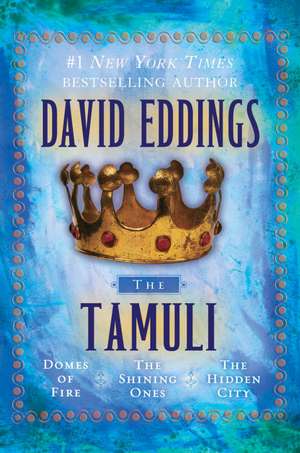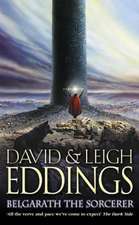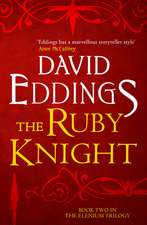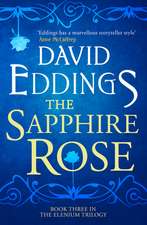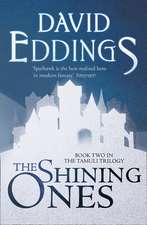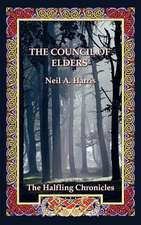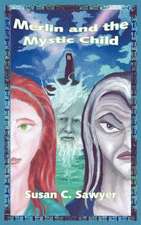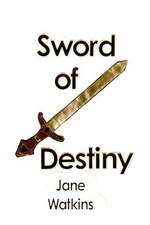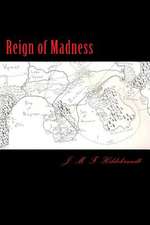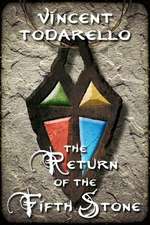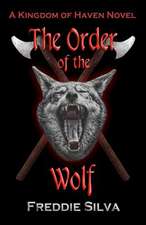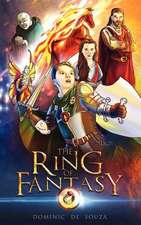The Tamuli: Domes of Fire - The Shining Ones - The Hidden City
Autor David Eddingsen Limba Engleză Paperback – 31 oct 2008
Danger stalks Queen Ehlana’s realm. Peasants whisper of the heroes of old who will rise again. Outlaw bands ravage the hill country. Then comes an ambassador from the far-off Tamuli empire, requesting aid: Tamuli is being torn apart by monsters, ancient warriors, and foul magics. Queen Ehlana turns to the great knight Sparhawk, and the two begin the perilous trek to the distant empire of the east, toward a glittering court seething with corruption and treachery.
This tale of rousing adventure, glory, and betrayal is fantasy at its best, as told by one of the finest storytellers of our time.
“This tale of comradeship, dastardly doings, multiple gods, strange races and noble and ignoble humans is vintage Eddings.”
–Publishers Weekly, on The Shining Ones
“Eddings continues to reward lovers of great, sweeping fantasies with creative ingenuity in characterization, world building, and magical effects.”
–Booklist, on The Hidden City
Preț: 140.46 lei
Nou
Puncte Express: 211
Preț estimativ în valută:
26.88€ • 28.06$ • 22.24£
26.88€ • 28.06$ • 22.24£
Carte disponibilă
Livrare economică 14-28 martie
Preluare comenzi: 021 569.72.76
Specificații
ISBN-13: 9780345500946
ISBN-10: 0345500946
Pagini: 1031
Dimensiuni: 155 x 226 x 38 mm
Greutate: 0.79 kg
Editura: Del Rey Books
ISBN-10: 0345500946
Pagini: 1031
Dimensiuni: 155 x 226 x 38 mm
Greutate: 0.79 kg
Editura: Del Rey Books
Extras
CHAPTER ONE
It was early spring, and the rain still had the lingering chill of winter. A soft, silvery drizzle sifted down out of the night sky and wreathed around the blocky watchtowers of Cimmura, hissing in the torches on each side of the broad gate and making the stones of the road leading up to the gate shiny and black. A lone rider approached the city. He was wrapped in a heavy traveller’s cloak and rode a tall, shaggy roan horse with a long nose and flat, vicious eyes. The traveller was a big man, a bigness of large, heavy bone and ropy tendon rather than of flesh. His hair was coarse and black, and at some time his nose had been broken. He rode easily but with the peculiar alertness of the trained warrior.
The big roan shuddered absently, shaking the rain out of his shaggy coat as they approached the east gate of the city and stopped in the ruddy circle of torchlight just outside the wall.
An unshaven gate guard in a rust-splotched breastplate and helmet, his patched green cloak hanging negligently from one shoulder, came out of the gate house to look inquiringly at the traveller. He was swaying slightly on his feet.
“Just passing through, neighbor,” the big man said in a quiet voice. He pushed back the hood of his cloak.
“Oh,” the guard said, “it’s you, Prince Sparhawk. I didn’t recognize you. Welcome home.”
“Thank you,” Sparhawk replied. He could smell the cheap wine on the man’s breath.
“Would you like to have me send word to the palace that you’ve arrived, your Highness?”
“No. Don’t bother them. I can unsaddle my own horse.” Sparhawk privately disliked ceremonies—particularly late at night. He leaned over and handed the guard a small coin. “Go back inside, neighbor. You’ll catch cold if you stand out here in the rain.” He nudged his horse and rode on through the gate.
The district near the city wall was poor, with shabby, run-down houses standing tightly packed beside each other, their second stories projecting out over the wet, littered streets. Sparhawk rode up a narrow, cobbled lane with the slow clatter of the big roan’s steel-shod hooves echoing back from the buildings. The night breeze had come up, and the crude signs identifying this or that tightly shuttered shop swung creaking on rusty hooks.
A dog with nothing better to do came out of an alley to bark at them with brainless self-importance. Sparhawk’s horse turned his head slightly to give the wet cur a long, level stare that spoke eloquently of death. The empty-headed dog’s barking trailed off and he cringed back, his ratlike tail between his legs. The horse bore down on him purposefully. The dog whined, then yelped, turned, and fled. Sparhawk’s horse snorted derisively.
“That makes you feel better, Faran?” Sparhawk asked the roan.
Faran flicked his ears.
“Shall we proceed then?”
A torch burned fitfully at an intersection, and a buxom young whore in a cheap dress stood, wet and bedraggled, in its ruddy, flaring light. Her dark hair was plastered to her head, the rouge on her cheeks was streaked, and she had a resigned expression on her face.
“What are you doing out here in the rain, Naween?” Sparhawk asked her, reining in his horse.
“I’ve been waiting for you, Sparhawk.” Her tone was arch, and her dark eyes wicked.
“Or for anyone else?”
“Of course. I am a professional, Sparhawk, but I still owe you. Shouldn’t we settle up one of these days?”
He ignored that. “What are you doing working the streets?”
“Shanda and I had a fight.” She shrugged. “I decided to go into business for myself.”
“You’re not vicious enough to be a street-girl, Naween.” He dipped his fingers into the pouch at his side, fished out several coins, and gave them to her. “Here,” he instructed. “Get a room in an inn someplace and stay off the streets for a few days. I’ll talk with Platime, and we’ll see if we can make some arrangements for you.”
Her eyes narrowed. “You don’t have to do that, Sparhawk. I can take care of myself.”
“Of course you can. That’s why you’re standing out here in the rain. Just do it, Naween. It’s too late and too wet for arguments.”
“This is two I owe you, Sparhawk. Are you absolutely sure . . .” She left it hanging.
“Quite sure, little sister. I’m married now, remember?”
“So?”
“Never mind. Get in out of the weather.” Sparhawk rode on, shaking his head. He liked Naween, but she was hopelessly incapable of taking care of herself.
He passed through a quiet square where all the shops and booths were shut down. There were few people abroad tonight, and few business opportunities.
He let his mind drift back over the past month and a half. No one in Lamorkand had been willing to talk with him. Archprelate Dolmant was a wise man, learned in doctrine and Church politics, but he was woefully ignorant of the way the common people thought. Sparhawk had patiently tried to explain to him that sending a Church Knight out to gather information was a waste of time, but Dolmant had insisted, and Sparhawk’s oath obliged him to obey. And so it was that he had wasted six weeks in the ugly cities of southern Lamorkand where no one had been willing to talk with him about anything more serious than the weather. To make matters even worse, Dolmant had quite obviously blamed the knight for his own blunder.
In a dark side street where the water dripped monotonously onto the cobblestones from the eaves of the houses, he felt Faran’s muscles tense. “Sorry,” he said quietly. “I wasn’t paying attention.” Someone was watching him, and he could clearly sense the animosity that had alerted his horse. Faran was a war-horse; he could probably sense antagonism in his veins. Sparhawk muttered a quick spell in the Styric tongue, concealing the gestures that accompanied it beneath his cloak. He released the spell slowly to avoid alerting whoever was watching him.
The watcher was not an Elene. Sparhawk sensed that immediately. He probed further. Then he frowned. There were more than one, and they were not Styrics either. He pulled his thought back, passively waiting for some clue as to their identity.
The realization came as a chilling shock. The watchers were not human. He shifted slightly in his saddle, sliding his hand toward his sword hilt.
Then the sense of the watchers was gone, and Faran shuddered with relief. He turned his ugly face to give his master a suspicious look.
“Don’t ask me, Faran,” Sparhawk told him. “I don’t know either.” But that was not entirely true. The touch of the minds in the darkness had been vaguely familiar, and that familiarity had raised questions in Sparhawk’s mind, questions he did not want to face.
He paused at the palace gate long enough to firmly instruct the soldiers not to wake the whole house, then he dismounted in the courtyard.
A young man stepped out into the rain-swept yard from the stable. “Why didn’t you send word that you were coming, Sparhawk?” he asked very quietly.
“Because I don’t particularly like parades and wild celebrations in the middle of the night,” Sparhawk told his squire, throwing back the hood of his cloak. “What are you doing up so late? I promised your mothers I’d make sure you got your rest. You’re going to get me in trouble, Khalad.”
“Are you trying to be funny?” Khalad’s voice was gruff, abrasive. He took Faran’s reins. “Come inside, Sparhawk. You’ll rust if you stand out here in the rain.”
“You’re as bad as your father was.”
“It’s an old family trait.” Khalad led the Prince Consort and his evil-tempered war-horse into the hay-smelling stable where a pair of lanterns gave off a golden light. Khalad was a husky young man with coarse black hair and a short-trimmed black beard. He wore tight-fitting black leather breeches, boots, and a sleeveless leather vest that left his arms and shoulders bare. A heavy dagger hung from his belt, and steel cuffs encircled his wrists. He looked and behaved so much like his father that Sparhawk felt again a pang of loss. “I thought Talen would be coming back with you,” Sparhawk’s squire said as he began unsaddling Faran.
“He’s got a cold. His mother—and yours—decided that he shouldn’t go out in the weather, and I certainly wasn’t going to argue with them.”
“Wise decision,” Khalad said, absently slapping Faran on the nose as the big roan tried to bite him. “How are they?”
“Your mothers? Fine. Aslade’s still trying to fatten Elys up, but she’s not having too much luck. How did you find out I was in town?”
“One of Platime’s cutthroats saw you coming through the gate. He sent word.”
“I suppose I should have known. You didn’t wake my wife, did you?”
“Not with Mirtai standing watch outside her door, I didn’t. Give me that wet cloak, my Lord. I’ll hang it in the kitchen to dry.”
Sparhawk grunted and removed his sodden cloak.
“The mail shirt, too, Sparhawk,” Khalad added, “before it rusts away entirely.”
Sparhawk nodded, unbelted his sword, and began to struggle out of his chain-mail shirt. “How’s your training going?”
Khalad made an indelicate sound. “I haven’t learned anything I didn’t already know. My father was a much better instructor than the ones at the chapterhouse. This idea of yours isn’t going to work, Sparhawk. The other novices are all aristocrats, and when my brothers and I outstrip them on the practice field, they resent it. We make enemies every time we turn around.” He lifted the saddle from Faran’s back and put it on the rail of a nearby stall. He briefly laid his hand on the big roan’s back, then bent, picked up a handful of straw, and began to rub him down.
“Wake some groom and have him do that,” Sparhawk told him. “Is anybody still awake in the kitchen?”
“The bakers are already up, I think.”
“Have one of them throw something together for me to eat. It’s been a long time since lunch.”
“All right. What took you so long in Chyrellos?”
“I took a little side trip into Lamorkand. The civil war there’s getting out of hand, and the Archprelate wanted me to nose around a bit.”
“You should have gotten word to your wife. She was just about to send Mirtai out to find you.” Khalad grinned at him. “I think you’re going to get yelled at again, Sparhawk.”
“There’s nothing new about that. Is Kalten here in the palace?”
Khalad nodded. “The food’s better here, and he isn’t expected to pray three times a day. Besides, I think he’s got his eye on one of the chambermaids.”
“That wouldn’t surprise me very much. Is Stragen here, too?”
“No. Something came up, and he had to go back to Emsat.”
“Get Kalten up, then. Have him join us in the kitchen. I want to talk with him. I’ll be along in a bit. I’m going to the bathhouse first.”
“The water won’t be warm. They let the fires go out at night.”
“We’re soldiers of God, Khalad. We’re all supposed to be unspeakably brave.”
“I’ll try to remember that, my Lord.”
The water in the bathhouse was definitely on the chilly side, so Sparhawk did not linger very long. He wrapped himself in a soft white robe and went through the dim corridors of the palace to the brightly lighted kitchens where Khalad waited with the sleepy-looking Kalten.
“Hail, noble Prince Consort,” Kalten said dryly. Sir Kalten obviously didn’t care much for the idea of being roused in the middle of the night.
“Hail, noble Boyhood Companion of the noble Prince Consort,” Sparhawk replied.
“Now there’s a cumbersome title,” Kalten said sourly. “What’s so important that it won’t wait until morning?”
Sparhawk sat down at one of the worktables, and a white-smocked baker brought him a plate of roast beef and a steaming loaf still hot from the oven.
“Thanks, neighbor,” Sparhawk said to him.
“Where have you been, Sparhawk?” Kalten demanded, sitting down across the table from his friend. Kalten had a wine flagon in one hand and a tin cup in the other.
“Sarathi sent me to Lamorkand,” Sparhawk replied, tearing a chunk of bread from the loaf.
“Your wife’s been making life miserable for everyone in the palace, you know.”
“It’s nice to know she cares.”
“Not for the rest of us, it isn’t. What did Dolmant need from Lamorkand?”
“Information. He didn’t altogether believe some of the reports he’s been getting.”
“What’s not to believe? The Lamorks are just engaging in their national pastime—civil war.”
“There seems to be something a little different this time. Do you remember Count Gerrich?”
“The one who had us besieged in Baron Alstrom’s castle? I never met him personally, but his name’s sort of familiar.”
“He seems to be coming out on top in the squabbles in western Lamorkand, and most everybody up there believes that he’s got his eye on the throne.”
“So?” Kalten helped himself to part of Sparhawk’s loaf of bread. “Every baron in Lamorkand has his eyes on the throne. What’s got Dolmant so concerned about it this time?”
“Gerrich’s been making alliances beyond the borders of Lamorkand. Some of those border barons in Pelosia are more or less independent of King Soros.”
“Everybody in Pelosia’s independent of Soros. He isn’t much of a king. He spends much too much time praying.”
“That’s a strange position for a soldier of God,” Khalad murmured.
“You’ve got to keep these things in perspective, Khalad,” Kalten told him. “Too much praying softens a man’s brains.”
“Anyway,” Sparhawk went on, “if Gerrich succeeds in dragging those Pelosian barons into his bid for King Friedahl’s throne, Friedahl’s going to have to declare war on Pelosia. The Church already has a war going on in Rendor, and Dolmant’s not very enthusiastic about a second front.” He paused. “I ran across something else, though,” he added. “I overheard a conversation I wasn’t supposed to. The name Drychtnath came up. Do you know anything about him?”
Kalten shrugged. “He was the national hero of the Lamorks, way back. They say he was about twelve feet tall, ate an ox for breakfast every morning, and drank a hogshead of mead every evening. The story has it that he could shatter rocks by scowling at them and reach up and stop the sun with one hand. The stories might be just a little bit exaggerated, though.”
“Very funny. The group I overheard were all telling each other that he’s returned.”
“That’d be a neat trick. I gather that his closest friend killed him. Stabbed him in the back and then ran a spear through his heart. You know how Lamorks are.”
“That’s a strange name,” Khalad noted. “What does it mean?”
“Drychtnath?” Kalten scratched his head. “ ‘Dreadnought,’ I think. Lamork mothers do that sort of thing to their children.” He drained his cup and tipped his flagon over it. A few drops came out. “Are we going to be much longer at this?” he asked. “If we’re going to sit up talking all night, I’ll get more wine. To be honest with you though, Sparhawk, I’d really rather go back to my nice warm bed.”
“And your nice warm chambermaid?” Khalad added.
“She gets lonesome.” Kalten shrugged. His face grew serious. “If the Lamorks are talking about Drychtnath again, it means that they’re starting to feel a little confined. Drychtnath wanted to rule the world, and anytime the Lamorks start invoking his name, it’s a fair indication that they’re beginning to look beyond their borders for elbow room.”
Sparhawk pushed back his plate. “It’s too late at night to start worrying about it now. Go back to bed, Kalten. You, too, Khalad. We can talk more about this tomorrow. I really ought to go pay a courtesy call on my wife.” He stood up.
“That’s all?” Kalten said. “A courtesy call?”
“There are many forms of courtesy, Kalten.”
The corridors in the palace were dimly illuminated by widely spaced candles. Sparhawk went quietly past the throne room to the royal apartment. As usual, Mirtai dozed in a chair beside the door. Sparhawk stopped and considered the Tamul giantess. When her face was in repose, she was heart-stoppingly beautiful. Her skin was golden in the candlelight, and her eyelashes were so long that they touched her cheeks. Her sword lay in her lap with her hand lightly enclosing its hilt.
“Don’t try to sneak up on me, Sparhawk.” She said it without opening her eyes.
“How did you know it was me?”
“I could smell you. All you Elenes seem to forget that we have noses.”
“How could you possibly smell me? I just took a bath.”
“Yes. I noticed that, too. You should have taken the time to let the water heat up a little more.”
“Sometimes you amaze me, do you know that?”
“You’re easily amazed, Sparhawk.” She opened her eyes. “Where have you been? Ehlana’s been nearly frantic.”
“How is she?”
“About the same. Aren’t you ever going to let her grow up? I’m getting very tired of being owned by a child.” In Mirtai’s own eyes, she was a slave, the property of Queen Ehlana. This in no way hindered her in ruling the royal family of Elenia with an iron fist, arbitrarily deciding what was good for them and what was not. She had brusquely dismissed all the queen’s attempts to emancipate her, pointing out that she was an Atan Tamul, and that her race was temperamentally unsuited for freedom. Sparhawk tended strongly to agree with her, since he was fairly certain that if she were left to follow her instincts, Mirtai could depopulate several fair-sized towns in short order.
She stood up, rising to her feet with exquisite grace. She was a good four inches taller than Sparhawk, and he felt again that odd sense of shrinking as he looked up at her. “What took you so long?” she asked him.
“I had to go to Lamorkand.”
“Was that your idea or somebody else’s?”
“Dolmant sent me.”
“Make sure Ehlana understands that right from the start. If she thinks you went there on your own, the fight will last for weeks, and all that wrangling gets on my nerves.” She produced the key to the royal apartment and gave Sparhawk a blunt, direct look. “Be very attentive, Sparhawk. She’s missed you a great deal, and she needs some tangible evidence of your affection. And don’t forget to bolt the bedroom door. Your daughter might be just a little young to be learning about certain things.” She unlocked the door.
“Mirtai, do you really have to lock us all in every night?”
“Yes, I do. I can’t get to sleep until I know that none of you is out wandering around the halls.”
Sparhawk sighed. “Oh, by the way,” he added. “Kring was in Chyrellos. I imagine he’ll be along in a few days to propose marriage to you again.”
“It’s about time.” She smiled. “It’s been three months since his last proposal. I was beginning to think he didn’t love me anymore.”
“Are you ever going to accept him?”
“We’ll see. Go wake up your wife, Sparhawk. I’ll let you out in the morning.” She gently pushed him through the doorway and locked the door behind him.
Sparhawk’s daughter, Princess Danae, was curled up in a large chair by the fire. Danae was six years old now. Her hair was very dark, and her skin as white as milk. Her dark eyes were large, and her mouth a small pink bow. She was quite the little lady, her manner serious and very grown-up. Her constant companion, nonetheless, was a battered and disreputable-looking stuffed toy animal named Rollo. Rollo had descended to Princess Danae from her mother. As usual, Princess Danae’s little feet had greenish grass stains on them. “You’re late, Sparhawk,” she said flatly to her father.
“Danae,” he said to her, “you know you’re not supposed to call me by name like that. If your mother hears you, she’s going to start asking questions.”
“She’s asleep.” Danae shrugged.
“Are you really sure about that?”
She gave him a withering look. “Of course I am. I’m not going to make any mistakes. I’ve done this many, many times before, you know. Where have you been?”
“I had to go to Lamorkand.”
“Didn’t it occur to you to send word to Mother? She’s been absolutely unbearable for the last few weeks.”
“I know. Any number of people have already told me about it. I didn’t really think I’d be gone for so long. I’m glad you’re awake. Maybe you can help me with something.”
“I’ll consider it—if you’re nice to me.”
“Stop that. What do you know about Drychtnath?”
“He was a barbarian, but he was an Elene, after all, so it was probably only natural.”
“Your prejudices are showing.”
“Nobody’s perfect. Why this sudden interest in ancient history?”
“There’s a wild story running through Lamorkand that Drychtnath’s returned. They’re all sitting around sharpening swords with exalted expressions on their faces. What’s the real significance of that?”
“He was their king three or four thousand years ago. It was shortly after you Elenes discovered fire and came out of your caves.”
“Be nice.”
“Yes, Father. Anyway, Drychtnath hammered all the Lamorks into something that sort of resembled unity and then set out to conquer the world. The Lamorks were very impressed with him. He worshipped the old Lamork Gods, though, and your Elene Church was a little uncomfortable with the notion of a pagan sitting on the throne of the whole world, so she had him murdered.”
“The Church wouldn’t do that,” he said flatly.
“Did you want to listen to the story or did you want to argue theology? After Drychtnath died, the Lamork priests disemboweled a few chickens and fondled their entrails in order to read the future. That’s really a disgusting practice, Sparhawk. It’s so messy.” She shuddered.
“Don’t blame me. I didn’t think it up.”
“The ‘auguries,’ as they called them, said that one day Drychtnath would return to take up where he’d left off and that he’d lead the Lamorks to world domination.”
“You mean they actually believe that?”
“They did once.”
“There are some rumors up there of backsliding—reversion to the worship of the old pagan Gods.”
“It’s the sort of thing you’d expect. When a Lamork starts thinking about Drychtnath, he automatically hauls the old Gods out of the closet. It’s so foolish. Aren’t there enough real Gods for them?”
“The old Lamork Gods aren’t real, then?”
“Of course not. Where’s your mind, Sparhawk?”
“The Troll-Gods are real. What’s the difference?”
“There’s all the difference in the world, Father. Any child can see that.”
“Why don’t I just take your word for it? And why don’t you go back to bed?”
“Because you haven’t kissed me yet.”
“Oh. Sorry. I had my mind on something else.”
“Keep your eye on the important things, Sparhawk. Do you want to have me wither away?”
“Of course not.”
“Then give me a kiss.”
He did that. As always she smelled of grass and trees. “Wash your feet,” he told her.
“Oh, bother,” she said.
“Do you want to spend a week explaining those grass stains to your mother?”
“That’s all I get?” she protested. “One meager little kiss and bathing instructions?”
He laughed, picked her up, and kissed her again—several times. Then he put her down. “Now scoot.”
She pouted a little and then sighed. She started back toward her bedroom, negligently carrying Rollo by one hind leg. “Don’t keep Mother up all night,” she said back over her shoulder. “And please try to be quiet. Why do you two always have to make so much noise?” She looked impishly back over her shoulder. “Why are you blushing, Father?” she asked innocently. Then she laughed and went on into her own room and closed the door.
He could never be sure if his daughter really understood the implications of such remarks, although he was certain that one level at least of her strangely layered personality understood quite well. He made sure that her door was latched and then went into the bedroom he shared with his wife. He closed and bolted the door behind him.
The fire had burned down to embers, but there was still sufficient light for him to be able to see the young woman who was the focus of his entire life. Her wealth of pale blond hair covered her pillow, and in sleep she looked very young and vulnerable. He stood at the foot of the bed looking at her. There were still traces in her face of the little girl he had trained and molded. He sighed. That train of thought always made him melancholy, because it brought home the fact that he was really too old for her. Ehlana should have a young husband—someone less battered, certainly someone handsome. He idly wondered where he had made the mistake that had so welded her affection to him that she had not even considered any other possible choice. It had probably been something minor—insignificant even. Who could ever know what kind of effect even the tiniest gesture might have on another?
“I know you’re there, Sparhawk,” she said without even opening her eyes. There was a slight edge to her voice.
“I was admiring the view.” A light tone might head off the incipient unpleasantness, though he didn’t really have much hope of that.
She opened her grey eyes. “Come over here,” she commanded, holding her arms out to him.
“I was ever your Majesty’s most obedient servant.” He grinned at her, going to the side of the bed.
“Oh, really?” she replied, wrapping her arms about his neck and kissing him. He kissed her back, and that went on for quite some time.
“Do you suppose we could save the scolding until tomorrow morning, love?” he asked. “I’m a little tired tonight. Why don’t we do the kissing and making up now, and you can scold me later?”
“And lose my edge? Don’t be silly. I’ve been saving up all sorts of things to say to you.”
“I can imagine. Dolmant sent me to Lamorkand to look into something. It took me a little longer than I expected.”
“That’s not fair, Sparhawk,” she accused.
“I didn’t follow that.”
“You weren’t supposed to say that yet. You’re supposed to wait until after I’ve demanded an explanation before you give me one. Now you’ve gone and spoiled it.”
“Can you ever forgive me?” He assumed an expression of exaggerated contrition and kissed her on the neck. His wife, he had discovered, loved these little games.
She laughed. “I’ll think about it.” She kissed him back. The women of his family were a very demonstrative little group, he decided. “All right then,” she said. “You’ve gone and spoiled it anyway, so you might as well tell me what you were doing, and why you didn’t send word that you’d be delayed.”
“Politics, love. You know Dolmant. Lamorkand is right on the verge of exploding. Sarathi wanted a professional assessment, but he didn’t want it generally known that I was going there at his instruction. He didn’t want any messages explaining things floating around.”
“I think it’s time for me to have a little talk with our revered Archprelate,” Ehlana said. “He seems to have a little trouble remembering just who I am.”
“I don’t recommend it, Ehlana.”
“I’m not going to start a fight with him, my love. I’m just going to point out to him that he’s ignoring the customary courtesies. He’s supposed to ask before he commandeers my husband. I’m getting just a little weary of his Imperial Archprelacy, so I’m going to teach him some manners.”
“Can I watch? That might just be a very interesting conversation.”
“Sparhawk,” she said, giving him a smoldering look, “if you want to avoid an official reprimand, you’re going to have to start taking some significant steps to soften my displeasure.”
“I was just getting to that,” he told her, enfolding her in a tighter embrace.
“What took you so long?” she breathed.
It was quite a bit later, and the displeasure of the Queen of Elenia seemed to be definitely softening. “What did you find out in Lamorkand, Sparhawk?” she asked, stretching languorously. Politics were never really very far from the queen’s mind.
“Western Lamorkand’s in turmoil right now. There’s a count up there— Gerrich, his name is. We ran across him when we were searching for Bhelliom. He was involved with Martel in one of those elaborate schemes devised to keep the Militant Orders out of Chyrellos during the election.”
“That speaks volumes about this count’s character.”
“Perhaps, but Martel was very good at manipulating people. He stirred up a small war between Gerrich and Patriarch Ortzel’s brother. Anyway, the campaign appears to have broadened the count’s horizons a bit. He’s begun to have some thoughts about the throne.”
“Poor Freddie.” Ehlana sighed. King Friedahl of Lamorkand was her distant cousin. “You couldn’t give me that throne of his. Why should the Church be concerned, though? Freddie’s got a large enough army to deal with one ambitious count.”
“It’s not quite so simple, love. Gerrich has been concluding alliances with other nobles in western Lamorkand. He’s amassed an army nearly as big as the king’s, and he’s been talking with the Pelosian barons around Lake Venne.”
“Those bandits,” she said with a certain contempt. “Anybody can buy them.”
“You’re well versed in the politics of the region, Ehlana.”
“I almost have to be, Sparhawk. Pelosia fronts my northeastern border. Does this current disturbance threaten us in any way?”
“Not at the moment. Gerrich has his eyes turned eastward—toward the capital.”
“Maybe I should offer Freddie an alliance,” she mused. “If general war breaks out in the region, I could snip off a nice piece of southwestern Pelosia.”
“Are we developing territorial ambitions, your Majesty?”
“Not tonight, Sparhawk,” she replied. “I’ve got other things on my mind tonight.” And she reached out to him again.
It was quite a bit later, almost dawn. Ehlana’s regular breathing told Sparhawk that she was asleep. He slipped from the bed and went to the window. His years of military training made it automatic for him to take a look at the weather just before daybreak.
The rain had abated, but the wind had picked up. It was early spring now, and there was little hope for decent weather for weeks. He was glad that he had reached home when he had, since the approaching day looked unpromising. He stared out at the torches flaring and tossing in the windy courtyard.
As they always did when the weather was bad, Sparhawk’s thoughts drifted back to the years he had spent in the sun-blasted city of Jiroch on the arid north coast of Rendor, where the women, all veiled and robed in black, went to the well in the steely first light of day, and where the woman named Lillias had consumed his nights with what she chose to call love. He did not, however, remember that night in Cippria when Martel’s assassins had quite nearly spilled out his life. He had settled that score with Martel in the Temple of Azash in Zemoch, so there was no real purpose in remembering the stockyard of Cippria, nor the sound of the monastery bells that had called to him out of the darkness.
That momentary sense of being watched, the sense that had come over him in the narrow street while he had been on his way to the palace, still nagged at him. Something he did not understand was going on, and he fervently wished that he could talk with Sephrenia about it.
It was early spring, and the rain still had the lingering chill of winter. A soft, silvery drizzle sifted down out of the night sky and wreathed around the blocky watchtowers of Cimmura, hissing in the torches on each side of the broad gate and making the stones of the road leading up to the gate shiny and black. A lone rider approached the city. He was wrapped in a heavy traveller’s cloak and rode a tall, shaggy roan horse with a long nose and flat, vicious eyes. The traveller was a big man, a bigness of large, heavy bone and ropy tendon rather than of flesh. His hair was coarse and black, and at some time his nose had been broken. He rode easily but with the peculiar alertness of the trained warrior.
The big roan shuddered absently, shaking the rain out of his shaggy coat as they approached the east gate of the city and stopped in the ruddy circle of torchlight just outside the wall.
An unshaven gate guard in a rust-splotched breastplate and helmet, his patched green cloak hanging negligently from one shoulder, came out of the gate house to look inquiringly at the traveller. He was swaying slightly on his feet.
“Just passing through, neighbor,” the big man said in a quiet voice. He pushed back the hood of his cloak.
“Oh,” the guard said, “it’s you, Prince Sparhawk. I didn’t recognize you. Welcome home.”
“Thank you,” Sparhawk replied. He could smell the cheap wine on the man’s breath.
“Would you like to have me send word to the palace that you’ve arrived, your Highness?”
“No. Don’t bother them. I can unsaddle my own horse.” Sparhawk privately disliked ceremonies—particularly late at night. He leaned over and handed the guard a small coin. “Go back inside, neighbor. You’ll catch cold if you stand out here in the rain.” He nudged his horse and rode on through the gate.
The district near the city wall was poor, with shabby, run-down houses standing tightly packed beside each other, their second stories projecting out over the wet, littered streets. Sparhawk rode up a narrow, cobbled lane with the slow clatter of the big roan’s steel-shod hooves echoing back from the buildings. The night breeze had come up, and the crude signs identifying this or that tightly shuttered shop swung creaking on rusty hooks.
A dog with nothing better to do came out of an alley to bark at them with brainless self-importance. Sparhawk’s horse turned his head slightly to give the wet cur a long, level stare that spoke eloquently of death. The empty-headed dog’s barking trailed off and he cringed back, his ratlike tail between his legs. The horse bore down on him purposefully. The dog whined, then yelped, turned, and fled. Sparhawk’s horse snorted derisively.
“That makes you feel better, Faran?” Sparhawk asked the roan.
Faran flicked his ears.
“Shall we proceed then?”
A torch burned fitfully at an intersection, and a buxom young whore in a cheap dress stood, wet and bedraggled, in its ruddy, flaring light. Her dark hair was plastered to her head, the rouge on her cheeks was streaked, and she had a resigned expression on her face.
“What are you doing out here in the rain, Naween?” Sparhawk asked her, reining in his horse.
“I’ve been waiting for you, Sparhawk.” Her tone was arch, and her dark eyes wicked.
“Or for anyone else?”
“Of course. I am a professional, Sparhawk, but I still owe you. Shouldn’t we settle up one of these days?”
He ignored that. “What are you doing working the streets?”
“Shanda and I had a fight.” She shrugged. “I decided to go into business for myself.”
“You’re not vicious enough to be a street-girl, Naween.” He dipped his fingers into the pouch at his side, fished out several coins, and gave them to her. “Here,” he instructed. “Get a room in an inn someplace and stay off the streets for a few days. I’ll talk with Platime, and we’ll see if we can make some arrangements for you.”
Her eyes narrowed. “You don’t have to do that, Sparhawk. I can take care of myself.”
“Of course you can. That’s why you’re standing out here in the rain. Just do it, Naween. It’s too late and too wet for arguments.”
“This is two I owe you, Sparhawk. Are you absolutely sure . . .” She left it hanging.
“Quite sure, little sister. I’m married now, remember?”
“So?”
“Never mind. Get in out of the weather.” Sparhawk rode on, shaking his head. He liked Naween, but she was hopelessly incapable of taking care of herself.
He passed through a quiet square where all the shops and booths were shut down. There were few people abroad tonight, and few business opportunities.
He let his mind drift back over the past month and a half. No one in Lamorkand had been willing to talk with him. Archprelate Dolmant was a wise man, learned in doctrine and Church politics, but he was woefully ignorant of the way the common people thought. Sparhawk had patiently tried to explain to him that sending a Church Knight out to gather information was a waste of time, but Dolmant had insisted, and Sparhawk’s oath obliged him to obey. And so it was that he had wasted six weeks in the ugly cities of southern Lamorkand where no one had been willing to talk with him about anything more serious than the weather. To make matters even worse, Dolmant had quite obviously blamed the knight for his own blunder.
In a dark side street where the water dripped monotonously onto the cobblestones from the eaves of the houses, he felt Faran’s muscles tense. “Sorry,” he said quietly. “I wasn’t paying attention.” Someone was watching him, and he could clearly sense the animosity that had alerted his horse. Faran was a war-horse; he could probably sense antagonism in his veins. Sparhawk muttered a quick spell in the Styric tongue, concealing the gestures that accompanied it beneath his cloak. He released the spell slowly to avoid alerting whoever was watching him.
The watcher was not an Elene. Sparhawk sensed that immediately. He probed further. Then he frowned. There were more than one, and they were not Styrics either. He pulled his thought back, passively waiting for some clue as to their identity.
The realization came as a chilling shock. The watchers were not human. He shifted slightly in his saddle, sliding his hand toward his sword hilt.
Then the sense of the watchers was gone, and Faran shuddered with relief. He turned his ugly face to give his master a suspicious look.
“Don’t ask me, Faran,” Sparhawk told him. “I don’t know either.” But that was not entirely true. The touch of the minds in the darkness had been vaguely familiar, and that familiarity had raised questions in Sparhawk’s mind, questions he did not want to face.
He paused at the palace gate long enough to firmly instruct the soldiers not to wake the whole house, then he dismounted in the courtyard.
A young man stepped out into the rain-swept yard from the stable. “Why didn’t you send word that you were coming, Sparhawk?” he asked very quietly.
“Because I don’t particularly like parades and wild celebrations in the middle of the night,” Sparhawk told his squire, throwing back the hood of his cloak. “What are you doing up so late? I promised your mothers I’d make sure you got your rest. You’re going to get me in trouble, Khalad.”
“Are you trying to be funny?” Khalad’s voice was gruff, abrasive. He took Faran’s reins. “Come inside, Sparhawk. You’ll rust if you stand out here in the rain.”
“You’re as bad as your father was.”
“It’s an old family trait.” Khalad led the Prince Consort and his evil-tempered war-horse into the hay-smelling stable where a pair of lanterns gave off a golden light. Khalad was a husky young man with coarse black hair and a short-trimmed black beard. He wore tight-fitting black leather breeches, boots, and a sleeveless leather vest that left his arms and shoulders bare. A heavy dagger hung from his belt, and steel cuffs encircled his wrists. He looked and behaved so much like his father that Sparhawk felt again a pang of loss. “I thought Talen would be coming back with you,” Sparhawk’s squire said as he began unsaddling Faran.
“He’s got a cold. His mother—and yours—decided that he shouldn’t go out in the weather, and I certainly wasn’t going to argue with them.”
“Wise decision,” Khalad said, absently slapping Faran on the nose as the big roan tried to bite him. “How are they?”
“Your mothers? Fine. Aslade’s still trying to fatten Elys up, but she’s not having too much luck. How did you find out I was in town?”
“One of Platime’s cutthroats saw you coming through the gate. He sent word.”
“I suppose I should have known. You didn’t wake my wife, did you?”
“Not with Mirtai standing watch outside her door, I didn’t. Give me that wet cloak, my Lord. I’ll hang it in the kitchen to dry.”
Sparhawk grunted and removed his sodden cloak.
“The mail shirt, too, Sparhawk,” Khalad added, “before it rusts away entirely.”
Sparhawk nodded, unbelted his sword, and began to struggle out of his chain-mail shirt. “How’s your training going?”
Khalad made an indelicate sound. “I haven’t learned anything I didn’t already know. My father was a much better instructor than the ones at the chapterhouse. This idea of yours isn’t going to work, Sparhawk. The other novices are all aristocrats, and when my brothers and I outstrip them on the practice field, they resent it. We make enemies every time we turn around.” He lifted the saddle from Faran’s back and put it on the rail of a nearby stall. He briefly laid his hand on the big roan’s back, then bent, picked up a handful of straw, and began to rub him down.
“Wake some groom and have him do that,” Sparhawk told him. “Is anybody still awake in the kitchen?”
“The bakers are already up, I think.”
“Have one of them throw something together for me to eat. It’s been a long time since lunch.”
“All right. What took you so long in Chyrellos?”
“I took a little side trip into Lamorkand. The civil war there’s getting out of hand, and the Archprelate wanted me to nose around a bit.”
“You should have gotten word to your wife. She was just about to send Mirtai out to find you.” Khalad grinned at him. “I think you’re going to get yelled at again, Sparhawk.”
“There’s nothing new about that. Is Kalten here in the palace?”
Khalad nodded. “The food’s better here, and he isn’t expected to pray three times a day. Besides, I think he’s got his eye on one of the chambermaids.”
“That wouldn’t surprise me very much. Is Stragen here, too?”
“No. Something came up, and he had to go back to Emsat.”
“Get Kalten up, then. Have him join us in the kitchen. I want to talk with him. I’ll be along in a bit. I’m going to the bathhouse first.”
“The water won’t be warm. They let the fires go out at night.”
“We’re soldiers of God, Khalad. We’re all supposed to be unspeakably brave.”
“I’ll try to remember that, my Lord.”
The water in the bathhouse was definitely on the chilly side, so Sparhawk did not linger very long. He wrapped himself in a soft white robe and went through the dim corridors of the palace to the brightly lighted kitchens where Khalad waited with the sleepy-looking Kalten.
“Hail, noble Prince Consort,” Kalten said dryly. Sir Kalten obviously didn’t care much for the idea of being roused in the middle of the night.
“Hail, noble Boyhood Companion of the noble Prince Consort,” Sparhawk replied.
“Now there’s a cumbersome title,” Kalten said sourly. “What’s so important that it won’t wait until morning?”
Sparhawk sat down at one of the worktables, and a white-smocked baker brought him a plate of roast beef and a steaming loaf still hot from the oven.
“Thanks, neighbor,” Sparhawk said to him.
“Where have you been, Sparhawk?” Kalten demanded, sitting down across the table from his friend. Kalten had a wine flagon in one hand and a tin cup in the other.
“Sarathi sent me to Lamorkand,” Sparhawk replied, tearing a chunk of bread from the loaf.
“Your wife’s been making life miserable for everyone in the palace, you know.”
“It’s nice to know she cares.”
“Not for the rest of us, it isn’t. What did Dolmant need from Lamorkand?”
“Information. He didn’t altogether believe some of the reports he’s been getting.”
“What’s not to believe? The Lamorks are just engaging in their national pastime—civil war.”
“There seems to be something a little different this time. Do you remember Count Gerrich?”
“The one who had us besieged in Baron Alstrom’s castle? I never met him personally, but his name’s sort of familiar.”
“He seems to be coming out on top in the squabbles in western Lamorkand, and most everybody up there believes that he’s got his eye on the throne.”
“So?” Kalten helped himself to part of Sparhawk’s loaf of bread. “Every baron in Lamorkand has his eyes on the throne. What’s got Dolmant so concerned about it this time?”
“Gerrich’s been making alliances beyond the borders of Lamorkand. Some of those border barons in Pelosia are more or less independent of King Soros.”
“Everybody in Pelosia’s independent of Soros. He isn’t much of a king. He spends much too much time praying.”
“That’s a strange position for a soldier of God,” Khalad murmured.
“You’ve got to keep these things in perspective, Khalad,” Kalten told him. “Too much praying softens a man’s brains.”
“Anyway,” Sparhawk went on, “if Gerrich succeeds in dragging those Pelosian barons into his bid for King Friedahl’s throne, Friedahl’s going to have to declare war on Pelosia. The Church already has a war going on in Rendor, and Dolmant’s not very enthusiastic about a second front.” He paused. “I ran across something else, though,” he added. “I overheard a conversation I wasn’t supposed to. The name Drychtnath came up. Do you know anything about him?”
Kalten shrugged. “He was the national hero of the Lamorks, way back. They say he was about twelve feet tall, ate an ox for breakfast every morning, and drank a hogshead of mead every evening. The story has it that he could shatter rocks by scowling at them and reach up and stop the sun with one hand. The stories might be just a little bit exaggerated, though.”
“Very funny. The group I overheard were all telling each other that he’s returned.”
“That’d be a neat trick. I gather that his closest friend killed him. Stabbed him in the back and then ran a spear through his heart. You know how Lamorks are.”
“That’s a strange name,” Khalad noted. “What does it mean?”
“Drychtnath?” Kalten scratched his head. “ ‘Dreadnought,’ I think. Lamork mothers do that sort of thing to their children.” He drained his cup and tipped his flagon over it. A few drops came out. “Are we going to be much longer at this?” he asked. “If we’re going to sit up talking all night, I’ll get more wine. To be honest with you though, Sparhawk, I’d really rather go back to my nice warm bed.”
“And your nice warm chambermaid?” Khalad added.
“She gets lonesome.” Kalten shrugged. His face grew serious. “If the Lamorks are talking about Drychtnath again, it means that they’re starting to feel a little confined. Drychtnath wanted to rule the world, and anytime the Lamorks start invoking his name, it’s a fair indication that they’re beginning to look beyond their borders for elbow room.”
Sparhawk pushed back his plate. “It’s too late at night to start worrying about it now. Go back to bed, Kalten. You, too, Khalad. We can talk more about this tomorrow. I really ought to go pay a courtesy call on my wife.” He stood up.
“That’s all?” Kalten said. “A courtesy call?”
“There are many forms of courtesy, Kalten.”
The corridors in the palace were dimly illuminated by widely spaced candles. Sparhawk went quietly past the throne room to the royal apartment. As usual, Mirtai dozed in a chair beside the door. Sparhawk stopped and considered the Tamul giantess. When her face was in repose, she was heart-stoppingly beautiful. Her skin was golden in the candlelight, and her eyelashes were so long that they touched her cheeks. Her sword lay in her lap with her hand lightly enclosing its hilt.
“Don’t try to sneak up on me, Sparhawk.” She said it without opening her eyes.
“How did you know it was me?”
“I could smell you. All you Elenes seem to forget that we have noses.”
“How could you possibly smell me? I just took a bath.”
“Yes. I noticed that, too. You should have taken the time to let the water heat up a little more.”
“Sometimes you amaze me, do you know that?”
“You’re easily amazed, Sparhawk.” She opened her eyes. “Where have you been? Ehlana’s been nearly frantic.”
“How is she?”
“About the same. Aren’t you ever going to let her grow up? I’m getting very tired of being owned by a child.” In Mirtai’s own eyes, she was a slave, the property of Queen Ehlana. This in no way hindered her in ruling the royal family of Elenia with an iron fist, arbitrarily deciding what was good for them and what was not. She had brusquely dismissed all the queen’s attempts to emancipate her, pointing out that she was an Atan Tamul, and that her race was temperamentally unsuited for freedom. Sparhawk tended strongly to agree with her, since he was fairly certain that if she were left to follow her instincts, Mirtai could depopulate several fair-sized towns in short order.
She stood up, rising to her feet with exquisite grace. She was a good four inches taller than Sparhawk, and he felt again that odd sense of shrinking as he looked up at her. “What took you so long?” she asked him.
“I had to go to Lamorkand.”
“Was that your idea or somebody else’s?”
“Dolmant sent me.”
“Make sure Ehlana understands that right from the start. If she thinks you went there on your own, the fight will last for weeks, and all that wrangling gets on my nerves.” She produced the key to the royal apartment and gave Sparhawk a blunt, direct look. “Be very attentive, Sparhawk. She’s missed you a great deal, and she needs some tangible evidence of your affection. And don’t forget to bolt the bedroom door. Your daughter might be just a little young to be learning about certain things.” She unlocked the door.
“Mirtai, do you really have to lock us all in every night?”
“Yes, I do. I can’t get to sleep until I know that none of you is out wandering around the halls.”
Sparhawk sighed. “Oh, by the way,” he added. “Kring was in Chyrellos. I imagine he’ll be along in a few days to propose marriage to you again.”
“It’s about time.” She smiled. “It’s been three months since his last proposal. I was beginning to think he didn’t love me anymore.”
“Are you ever going to accept him?”
“We’ll see. Go wake up your wife, Sparhawk. I’ll let you out in the morning.” She gently pushed him through the doorway and locked the door behind him.
Sparhawk’s daughter, Princess Danae, was curled up in a large chair by the fire. Danae was six years old now. Her hair was very dark, and her skin as white as milk. Her dark eyes were large, and her mouth a small pink bow. She was quite the little lady, her manner serious and very grown-up. Her constant companion, nonetheless, was a battered and disreputable-looking stuffed toy animal named Rollo. Rollo had descended to Princess Danae from her mother. As usual, Princess Danae’s little feet had greenish grass stains on them. “You’re late, Sparhawk,” she said flatly to her father.
“Danae,” he said to her, “you know you’re not supposed to call me by name like that. If your mother hears you, she’s going to start asking questions.”
“She’s asleep.” Danae shrugged.
“Are you really sure about that?”
She gave him a withering look. “Of course I am. I’m not going to make any mistakes. I’ve done this many, many times before, you know. Where have you been?”
“I had to go to Lamorkand.”
“Didn’t it occur to you to send word to Mother? She’s been absolutely unbearable for the last few weeks.”
“I know. Any number of people have already told me about it. I didn’t really think I’d be gone for so long. I’m glad you’re awake. Maybe you can help me with something.”
“I’ll consider it—if you’re nice to me.”
“Stop that. What do you know about Drychtnath?”
“He was a barbarian, but he was an Elene, after all, so it was probably only natural.”
“Your prejudices are showing.”
“Nobody’s perfect. Why this sudden interest in ancient history?”
“There’s a wild story running through Lamorkand that Drychtnath’s returned. They’re all sitting around sharpening swords with exalted expressions on their faces. What’s the real significance of that?”
“He was their king three or four thousand years ago. It was shortly after you Elenes discovered fire and came out of your caves.”
“Be nice.”
“Yes, Father. Anyway, Drychtnath hammered all the Lamorks into something that sort of resembled unity and then set out to conquer the world. The Lamorks were very impressed with him. He worshipped the old Lamork Gods, though, and your Elene Church was a little uncomfortable with the notion of a pagan sitting on the throne of the whole world, so she had him murdered.”
“The Church wouldn’t do that,” he said flatly.
“Did you want to listen to the story or did you want to argue theology? After Drychtnath died, the Lamork priests disemboweled a few chickens and fondled their entrails in order to read the future. That’s really a disgusting practice, Sparhawk. It’s so messy.” She shuddered.
“Don’t blame me. I didn’t think it up.”
“The ‘auguries,’ as they called them, said that one day Drychtnath would return to take up where he’d left off and that he’d lead the Lamorks to world domination.”
“You mean they actually believe that?”
“They did once.”
“There are some rumors up there of backsliding—reversion to the worship of the old pagan Gods.”
“It’s the sort of thing you’d expect. When a Lamork starts thinking about Drychtnath, he automatically hauls the old Gods out of the closet. It’s so foolish. Aren’t there enough real Gods for them?”
“The old Lamork Gods aren’t real, then?”
“Of course not. Where’s your mind, Sparhawk?”
“The Troll-Gods are real. What’s the difference?”
“There’s all the difference in the world, Father. Any child can see that.”
“Why don’t I just take your word for it? And why don’t you go back to bed?”
“Because you haven’t kissed me yet.”
“Oh. Sorry. I had my mind on something else.”
“Keep your eye on the important things, Sparhawk. Do you want to have me wither away?”
“Of course not.”
“Then give me a kiss.”
He did that. As always she smelled of grass and trees. “Wash your feet,” he told her.
“Oh, bother,” she said.
“Do you want to spend a week explaining those grass stains to your mother?”
“That’s all I get?” she protested. “One meager little kiss and bathing instructions?”
He laughed, picked her up, and kissed her again—several times. Then he put her down. “Now scoot.”
She pouted a little and then sighed. She started back toward her bedroom, negligently carrying Rollo by one hind leg. “Don’t keep Mother up all night,” she said back over her shoulder. “And please try to be quiet. Why do you two always have to make so much noise?” She looked impishly back over her shoulder. “Why are you blushing, Father?” she asked innocently. Then she laughed and went on into her own room and closed the door.
He could never be sure if his daughter really understood the implications of such remarks, although he was certain that one level at least of her strangely layered personality understood quite well. He made sure that her door was latched and then went into the bedroom he shared with his wife. He closed and bolted the door behind him.
The fire had burned down to embers, but there was still sufficient light for him to be able to see the young woman who was the focus of his entire life. Her wealth of pale blond hair covered her pillow, and in sleep she looked very young and vulnerable. He stood at the foot of the bed looking at her. There were still traces in her face of the little girl he had trained and molded. He sighed. That train of thought always made him melancholy, because it brought home the fact that he was really too old for her. Ehlana should have a young husband—someone less battered, certainly someone handsome. He idly wondered where he had made the mistake that had so welded her affection to him that she had not even considered any other possible choice. It had probably been something minor—insignificant even. Who could ever know what kind of effect even the tiniest gesture might have on another?
“I know you’re there, Sparhawk,” she said without even opening her eyes. There was a slight edge to her voice.
“I was admiring the view.” A light tone might head off the incipient unpleasantness, though he didn’t really have much hope of that.
She opened her grey eyes. “Come over here,” she commanded, holding her arms out to him.
“I was ever your Majesty’s most obedient servant.” He grinned at her, going to the side of the bed.
“Oh, really?” she replied, wrapping her arms about his neck and kissing him. He kissed her back, and that went on for quite some time.
“Do you suppose we could save the scolding until tomorrow morning, love?” he asked. “I’m a little tired tonight. Why don’t we do the kissing and making up now, and you can scold me later?”
“And lose my edge? Don’t be silly. I’ve been saving up all sorts of things to say to you.”
“I can imagine. Dolmant sent me to Lamorkand to look into something. It took me a little longer than I expected.”
“That’s not fair, Sparhawk,” she accused.
“I didn’t follow that.”
“You weren’t supposed to say that yet. You’re supposed to wait until after I’ve demanded an explanation before you give me one. Now you’ve gone and spoiled it.”
“Can you ever forgive me?” He assumed an expression of exaggerated contrition and kissed her on the neck. His wife, he had discovered, loved these little games.
She laughed. “I’ll think about it.” She kissed him back. The women of his family were a very demonstrative little group, he decided. “All right then,” she said. “You’ve gone and spoiled it anyway, so you might as well tell me what you were doing, and why you didn’t send word that you’d be delayed.”
“Politics, love. You know Dolmant. Lamorkand is right on the verge of exploding. Sarathi wanted a professional assessment, but he didn’t want it generally known that I was going there at his instruction. He didn’t want any messages explaining things floating around.”
“I think it’s time for me to have a little talk with our revered Archprelate,” Ehlana said. “He seems to have a little trouble remembering just who I am.”
“I don’t recommend it, Ehlana.”
“I’m not going to start a fight with him, my love. I’m just going to point out to him that he’s ignoring the customary courtesies. He’s supposed to ask before he commandeers my husband. I’m getting just a little weary of his Imperial Archprelacy, so I’m going to teach him some manners.”
“Can I watch? That might just be a very interesting conversation.”
“Sparhawk,” she said, giving him a smoldering look, “if you want to avoid an official reprimand, you’re going to have to start taking some significant steps to soften my displeasure.”
“I was just getting to that,” he told her, enfolding her in a tighter embrace.
“What took you so long?” she breathed.
It was quite a bit later, and the displeasure of the Queen of Elenia seemed to be definitely softening. “What did you find out in Lamorkand, Sparhawk?” she asked, stretching languorously. Politics were never really very far from the queen’s mind.
“Western Lamorkand’s in turmoil right now. There’s a count up there— Gerrich, his name is. We ran across him when we were searching for Bhelliom. He was involved with Martel in one of those elaborate schemes devised to keep the Militant Orders out of Chyrellos during the election.”
“That speaks volumes about this count’s character.”
“Perhaps, but Martel was very good at manipulating people. He stirred up a small war between Gerrich and Patriarch Ortzel’s brother. Anyway, the campaign appears to have broadened the count’s horizons a bit. He’s begun to have some thoughts about the throne.”
“Poor Freddie.” Ehlana sighed. King Friedahl of Lamorkand was her distant cousin. “You couldn’t give me that throne of his. Why should the Church be concerned, though? Freddie’s got a large enough army to deal with one ambitious count.”
“It’s not quite so simple, love. Gerrich has been concluding alliances with other nobles in western Lamorkand. He’s amassed an army nearly as big as the king’s, and he’s been talking with the Pelosian barons around Lake Venne.”
“Those bandits,” she said with a certain contempt. “Anybody can buy them.”
“You’re well versed in the politics of the region, Ehlana.”
“I almost have to be, Sparhawk. Pelosia fronts my northeastern border. Does this current disturbance threaten us in any way?”
“Not at the moment. Gerrich has his eyes turned eastward—toward the capital.”
“Maybe I should offer Freddie an alliance,” she mused. “If general war breaks out in the region, I could snip off a nice piece of southwestern Pelosia.”
“Are we developing territorial ambitions, your Majesty?”
“Not tonight, Sparhawk,” she replied. “I’ve got other things on my mind tonight.” And she reached out to him again.
It was quite a bit later, almost dawn. Ehlana’s regular breathing told Sparhawk that she was asleep. He slipped from the bed and went to the window. His years of military training made it automatic for him to take a look at the weather just before daybreak.
The rain had abated, but the wind had picked up. It was early spring now, and there was little hope for decent weather for weeks. He was glad that he had reached home when he had, since the approaching day looked unpromising. He stared out at the torches flaring and tossing in the windy courtyard.
As they always did when the weather was bad, Sparhawk’s thoughts drifted back to the years he had spent in the sun-blasted city of Jiroch on the arid north coast of Rendor, where the women, all veiled and robed in black, went to the well in the steely first light of day, and where the woman named Lillias had consumed his nights with what she chose to call love. He did not, however, remember that night in Cippria when Martel’s assassins had quite nearly spilled out his life. He had settled that score with Martel in the Temple of Azash in Zemoch, so there was no real purpose in remembering the stockyard of Cippria, nor the sound of the monastery bells that had called to him out of the darkness.
That momentary sense of being watched, the sense that had come over him in the narrow street while he had been on his way to the palace, still nagged at him. Something he did not understand was going on, and he fervently wished that he could talk with Sephrenia about it.
Notă biografică
David Eddings
